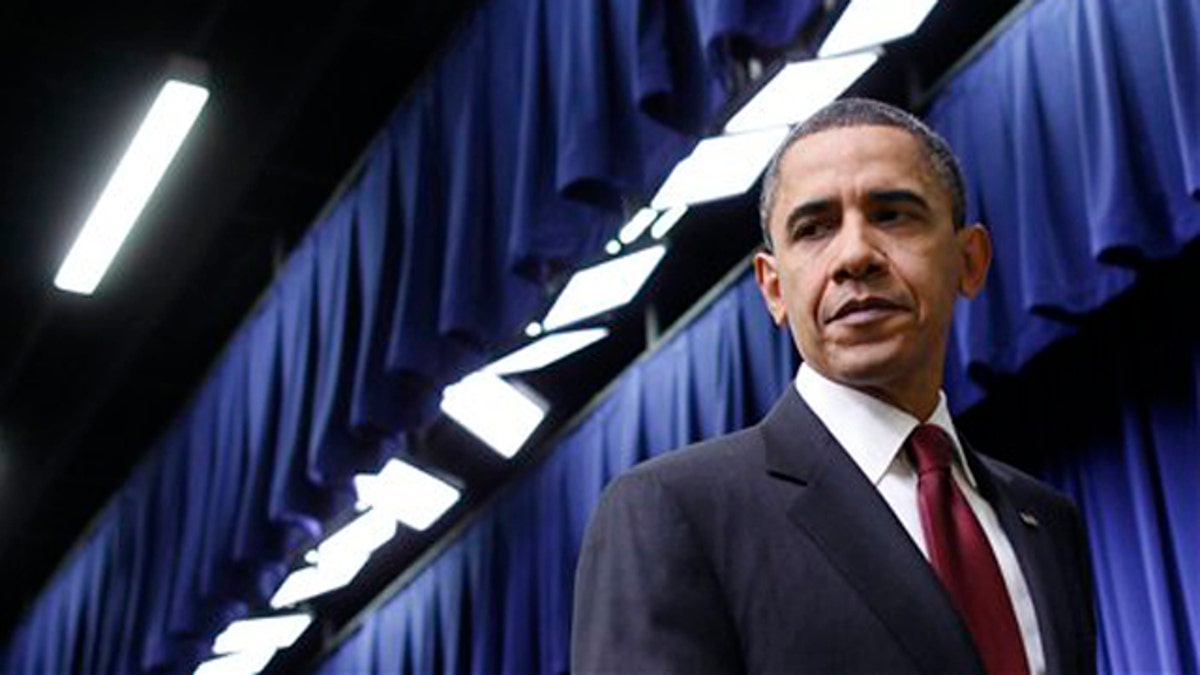
Friday: President Obama walks off stage after a ceremony in the Eisenhower Executive Office Building on the White House complex. (AP)
President Obama has delayed his Christmas vacation in Hawaii while he makes calls Monday to lobby senators to back an arms treaty with Russia that several Senate Republicans say they will not support.
With a wide-open schedule -- the result of his family heading on vacation Saturday without him -- the president is working the phones to try to win support for START, a White House aide said. The aide would not disclose how many phone calls the president was making or to whom.
White House Press Secretary Robert Gibbs said later in the day that the White House "believes that before Congress leaves town the Senate will ratify START."
Senate Majority Leader Harry Reid, D-Nev., took to the floor Monday to announce a schedule that included a procedural vote on the treaty to be taken up on Tuesday. In the meantime, the Senate was to go into closed session to debate the accord and could emerge to vote on a continuing resolution to fund government into March and later in the week a health care bill for Sept. 11 emergency workers.
But with Republican opposition to START delaying its ratification -- possibly into next year -- Reid warned that the clock is ticking.
"Last year we were here up until Christmas Eve, and I hope we don't do that this year for everyone," he said.
Senate Republican leader Mitch McConnell, R-Ky., who announced over the weekend that he would not vote for the new START, and whose notice gives other Republicans cover to oppose the treaty, said Monday that lawmakers need to take the time "to make informed decisions, and so leaving aside for a moment any substantive concerns, this is reason enough to delay a vote."
McConnell argued that the administration has a proven record of trying to rush implementation of a policy without fully reviewing the implications, and pointed to the problem with trying to shutter the Guantanamo Bay detention facility, ordering troops to withdraw from Afghanistan in July 2011 before knowing what the situation on the ground will be and insisting the repeal of don't ask, don't tell won't impact combat readiness or cohesion of U.S. troops.
"The administration has taken the same cart-before-the-horse approach on the treaty before us," McConnell said. "We had to rush this treaty, according to the logic of the administration because it had become an important component in the effort to 'reset' the bilateral relationship with the Russian Federation. It was brought up for debate prematurely because it was the first step in a pre-determined arms control agenda. The Senate's constitutional role of advice and consent became an inconvenient impediment."
Nonetheless, the White House and Senate Democratic leaders are claiming confidence they will have enough votes -- 67, or two-thirds of the Senate --.for passage of the arms treaty. New York Sen. Charles Schumer said Democrats have now picked up the support of another Republican senator and need nine or 10 Republican votes to prevail.
"It's going to be a real slog, house by house combat if you will," Schumer told ABC television's "Good Morning America" on Monday. "But I think we'll be there."
Democrats expect to get 57 votes from their caucus, with Oregon Sen. Ron Wyden absent due to cancer surgery. Four Republican senators, including the ranking member of the Foreign Relations Committee, Sen. Richard Lugar, have said they back the treaty.
The White House and Democrats are determined to win approval of the treaty before January, when Republicans increase their numbers in the Senate, dimming its outlook. During a rare Sunday session of the Senate, Democrats turned back a Republican amendment to change the treaty, which would have effectively killed it.
Obama's letter to congressional leaders Saturday vowing to move ahead on missile defense -- a key hang-up for lawmakers who say the preamble links development of it to strategic arms reduction -- carried sway, some Republicans said. But Sen. John McCain, the Republican presidential candidate in 2008, said he was still undecided.
Obama and Russian President Dmitry Medvedev signed the accord in April. It would limit each country's strategic nuclear warheads to 1,550, down from the current ceiling of 2,200. It would also establish a system for monitoring and verification. U.S. weapons inspections ended a year ago with the expiration of a 1991 treaty.
Proponents of the treaty, including much of the military and foreign policy establishment, cite the renewed weapons inspections and say the pact would keep the two biggest nuclear powers on the path to reducing their arsenals.
Fox News' Mike Emanuel and Trish Turner and The Associated Press contributed to this report.












































